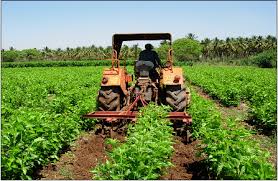In a major stride towards food security and industrial growth, Nigeria and Brazil have signed a landmark $1 billion Memorandum of Understanding (MoU) aimed at transforming Nigeria’s agricultural sector through mechanization and technology transfer.
The agreement was announced by Bola Tinubu, the Nigerian president, in a statement following the official reception of Brazil’s Vice President, Geraldo Alckmin, and his wife, Maria Lúcia Alckmin, by Nigeria’s Vice President, Kashim Shettima, in Abuja.
The Brazilian delegation is on a three-day state visit to Nigeria intended to strengthen diplomatic and economic ties between the two nations.
Highlighting the significance of the visit, Tinubu described the engagement as a reaffirmation of “the enduring ties between Nigeria and Brazil, two diverse democracies linked by shared values, historical connections, and a common ambition for inclusive, people-driven growth.”
Among the key outcomes of the visit is the $1 billion Green Imperative Programme, a bilateral agricultural mechanisation initiative anchored by Nigeria’s Federal Ministry of Agriculture and Food Security, in collaboration with Brazil’s Ministry of Foreign Affairs and private sector partners.
According to Tinubu, the programme is poised to overhaul Nigeria’s agricultural value chain through advanced technology, capacity building, and the establishment of mechanisation service centres nationwide.
“The landmark \$1 billion Green Imperative Programme… stands as a flagship of this renewed partnership,” he said.
The $1 billion agricultural mechanisation agreement between Nigeria and Brazil marks a transformative step toward addressing Nigeria’s long-standing food insecurity challenges. By introducing modern farming equipment, establishing service centres across the country, and facilitating technology transfer, the initiative promises to significantly boost agricultural productivity. This not only enhances food availability but also positions agriculture as a viable economic driver, capable of reducing reliance on imports, stimulating rural development, and creating thousands of jobs in farming, logistics, and agro-processing.
The deal comes at a critical time when conflict in the North East region has displaced 2.2 million people and left another 4.4 million food insecure in Borno, Adamawa, and Yobe states. Three million of those affected are in Borno State, the epicentre of insurgency. Nigeria is also subject to periodic droughts and floods, which have further reduced agricultural output and increased vulnerability, especially in rural communities. Insurgent activities have added pressure to a fragile resource environment, deepened insecurity, hampered development, and heightened the food and nutrition insecurity of vulnerable women and children.
Beyond food production, the deal signals a deeper diplomatic and economic alignment between Nigeria and Brazil, reflecting a commitment to South–South cooperation rooted in shared growth. It paves the way for broader collaboration in sectors like renewable energy, climate action, and trade. With plans for Nigeria’s active participation in COP30 and the signing of over 30 MoUs covering defence, education, and industrial development, this partnership holds the potential to elevate Nigeria’s global standing.
However, its success will hinge on effective implementation, transparency, and inclusive policies that ensure smallholder farmers and local communities benefit meaningfully from the programme.
Beyond agriculture, the state visit is expected to deliver over 30 Memoranda of Understanding spanning defence and security cooperation, renewable energy and energy transition, trade and industrialisation, healthcare, cultural exchange, and education.
“We are exploring actionable pathways to deepen cooperation across key sectors: agribusiness and food security, trade and industrialisation, energy transition, healthcare delivery, innovation, defense, and cultural exchange,” Tinubu stated.
He further revealed that the Nigerian government looks forward to participating actively in COP30, which will be hosted in Belém, Brazil, strengthening collaboration on climate action and environmental sustainability.
The president noted that this renewed diplomatic engagement signals a move from rhetoric to results, especially in areas like joint ventures in renewable energy, creative industry linkages, and security cooperation.
“As our Brazilian friends say, ‘Juntos somos mais fortes’, together we are stronger,” Tinubu said, emphasizing Nigeria’s commitment to building resilient South–South partnerships founded on mutual respect and shared prosperity.
Nigeria and Brazil have signed a significant $1 billion Memorandum of Understanding (MoU) to revolutionize Nigeria's agricultural sector through mechanization and technology transfer.
Announced by Nigerian President Bola Tinubu during Brazil's Vice President Geraldo Alckmin's visit, the agreement focuses on the Green Imperative Programme, which aims to enhance agricultural productivity, reduce food insecurity, stimulate rural development, and create numerous jobs.
This comes as Nigeria faces challenges like displacement due to conflict and climate-related impacts, heightening food insecurity.
The partnership is not only a key step towards food security but also signifies strengthened diplomatic and economic relations with broader implications, including renewable energy, climate action, trade, industrial development, and security cooperation.
As part of the deal, Nigeria intends to engage actively at COP30 hosted in Brazil, emphasizing shared growth and deeper South–South cooperation.
However, the success of this initiative will depend on effective implementation, inclusiveness, and transparency to ensure that benefits reach smallholder farmers and local communities.






